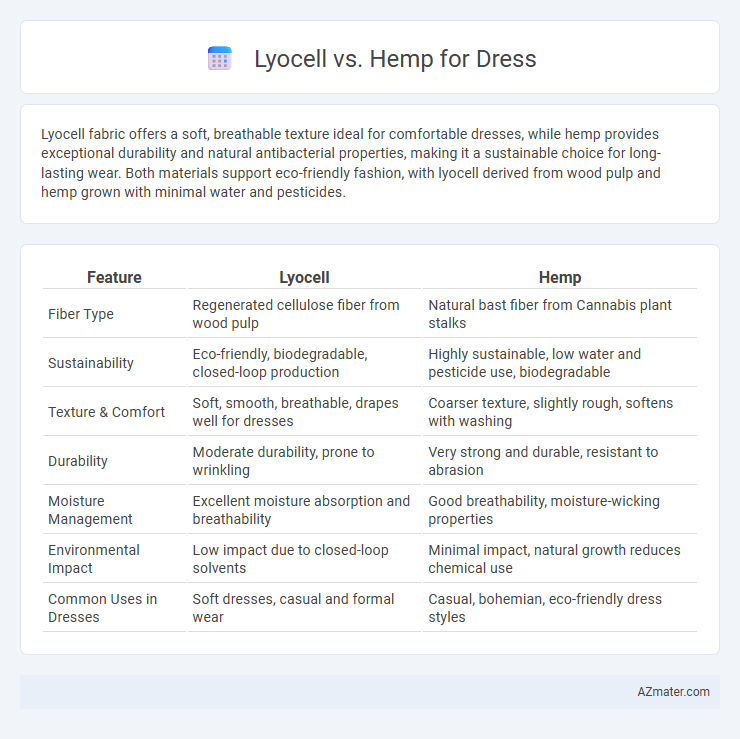Lyocell fabric offers a soft, breathable texture ideal for comfortable dresses, while hemp provides exceptional durability and natural antibacterial properties, making it a sustainable choice for long-lasting wear. Both materials support eco-friendly fashion, with lyocell derived from wood pulp and hemp grown with minimal water and pesticides.
Table of Comparison
| Feature | Lyocell | Hemp |
|---|---|---|
| Fiber Type | Regenerated cellulose fiber from wood pulp | Natural bast fiber from Cannabis plant stalks |
| Sustainability | Eco-friendly, biodegradable, closed-loop production | Highly sustainable, low water and pesticide use, biodegradable |
| Texture & Comfort | Soft, smooth, breathable, drapes well for dresses | Coarser texture, slightly rough, softens with washing |
| Durability | Moderate durability, prone to wrinkling | Very strong and durable, resistant to abrasion |
| Moisture Management | Excellent moisture absorption and breathability | Good breathability, moisture-wicking properties |
| Environmental Impact | Low impact due to closed-loop solvents | Minimal impact, natural growth reduces chemical use |
| Common Uses in Dresses | Soft dresses, casual and formal wear | Casual, bohemian, eco-friendly dress styles |
Introduction to Lyocell and Hemp Fabrics
Lyocell, a sustainable fiber derived from wood pulp, is known for its softness, breathability, and moisture-wicking properties, making it ideal for dresses that require comfort and durability. Hemp fabric, produced from the fibers of the Cannabis sativa plant, offers exceptional strength, natural antimicrobial qualities, and biodegradability, often favored for eco-conscious fashion. Both materials emphasize environmental sustainability but differ significantly in texture and performance, with Lyocell providing a smooth, silky feel and hemp delivering a more textured, robust fabric suitable for stylish and long-lasting dresses.
Fabric Production Processes Compared
Lyocell production involves dissolving wood pulp in a non-toxic solvent through a closed-loop process that recycles 99% of chemicals, ensuring minimal environmental impact. Hemp fabric production starts with harvesting fibrous stalks subjected to retting and decortication, followed by spinning fibers into yarn, which generally requires less water and synthetic chemicals compared to Lyocell. Both methods emphasize sustainability, but Lyocell's closed-loop chemical recovery contrasts with hemp's more mechanical, low-input fiber extraction process.
Sustainability and Environmental Impact
Lyocell is a biodegradable fabric made from sustainably harvested wood pulp, using a closed-loop process that recycles 99% of the chemicals and water, significantly reducing environmental impact. Hemp cultivation requires minimal water and no pesticides, regenerates soil health, and absorbs more CO2 than many other crops, making it one of the most eco-friendly fibers for dress production. While Lyocell offers smooth, soft textures ideal for garments, hemp provides durability and breathability with a much lower carbon footprint.
Comfort and Wearability for Dresses
Lyocell offers exceptional softness and breathability, making it ideal for dresses that require a smooth, comfortable feel against the skin. Hemp fabric is highly durable and moisture-wicking, providing excellent breathability but with a coarser texture that softens with wear. Dresses made from Lyocell typically offer superior drape and lightweight comfort, while hemp dresses excel in long-lasting wearability and eco-friendly performance.
Durability and Longevity
Lyocell offers a smooth texture and moderate durability, making it resistant to wrinkles and suitable for everyday dresswear, but it may wear out faster with frequent washing. Hemp is highly durable and naturally resistant to abrasion, retaining its strength and shape over time, which ensures longer-lasting dresses even under regular use. Both fibers provide eco-friendly options, yet hemp outperforms lyocell in terms of longevity and heavy-duty wear.
Breathability and Moisture Management
Lyocell fabric offers superior breathability and excellent moisture-wicking properties, making it ideal for dresses in warm climates or active settings. Hemp fibers provide natural breathability and antimicrobial qualities but tend to retain more moisture compared to Lyocell, potentially leading to slower drying times. The moisture management efficiency of Lyocell surpasses hemp, enhancing comfort by drawing sweat away from the skin and promoting quick evaporation.
Style, Texture, and Aesthetic Appeal
Lyocell offers a smooth, silky texture with excellent drape, making dresses appear elegant and fluid in movement, while hemp fabric provides a coarser, more textured feel with a naturally rustic and earthy aesthetic. Lyocell's ability to hold vibrant dyes enhances the style versatility of dresses, contrasting with hemp's matte finish that lends a casual, eco-friendly look. The breathable and moisture-wicking properties of both fibers contribute to comfort, but Lyocell's softness appeals more to formal wear, whereas hemp suits relaxed, bohemian styles.
Care and Maintenance Requirements
Lyocell dresses require gentle machine washing or hand washing with mild detergent, avoiding high heat to prevent shrinking or damage to fibers, and benefit from air drying to maintain fabric softness and shape. Hemp dresses are highly durable and resistant to wear, often machine washable in cold water without frequent ironing, although they may become softer and more comfortable after several washes. Both fabrics demand minimal care, but lyocell requires more delicate handling to preserve its smooth texture, while hemp's robust nature allows for easier maintenance.
Price and Market Availability
Lyocell dresses typically cost between $50 and $150 due to the sustainable production process but benefit from increasing market availability in mainstream fashion outlets. Hemp dresses, while often priced around $40 to $120, remain less widely available, primarily found in niche eco-friendly or specialty stores. Market trends show lyocell gaining broader retail presence, whereas hemp's availability is growing more slowly despite its durability and eco-friendly properties.
Which Fabric is Best for Dresses?
Lyocell offers a smooth, silky texture with excellent breathability and moisture-wicking properties, making it ideal for lightweight, flowy dresses. Hemp fabric provides superior durability and natural antimicrobial qualities, perfect for structured, eco-friendly dresses that require longevity. Selecting the best fabric depends on the dress's design priorities: choose lyocell for softness and drape, while hemp excels in strength and sustainability.

Infographic: Lyocell vs Hemp for Dress
 azmater.com
azmater.com